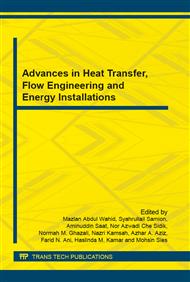p.42
p.46
p.58
p.63
p.69
p.74
p.78
p.83
p.88
Thermal Conductivity for Mixture of Rice Husk Fiber and Gypsum
Abstract:
This project is conducted with aim to determine the thermal conductivity for mixture of rice husk fiber and gypsum. The thermal conductivity value for 100% gypsum is also determined in this project for comparison purpose. The experiment used the Guarded Hot Plate Method, single specimen apparatus. This method is based on one-dimensional heat flow through conduction and steady state technique. Four samples have been tested which are 100% gypsum with a mass of 1kg for sample 1, a mixture of 0.1kg of rice husk fiber and 1kg gypsum for sample 2, mixture of 0.2kg of rice husk fiber and 1kg gypsum for sample 3 and a mixture of 0.3kg of rice husk fiber and 1kg gypsum for sample 4. From the data of the experiment that have been carried out, the value of thermal conductivity is decreasing with the increasing of rice husk fiber in the sample. The value of thermal conductivity is 0.772W/mK for sample 1, 0.7574 W/mK for sample 2, 0.7469W/mK for sample 3 and 0.7368W/mK for sample 4. The rice husk fiber is a bio-waste material and the mixture of rice husk fiber and gypsum will add value to the material as gypsum are widely used in construction field such as for plaster ingredient and ceiling finishing because it is a good insulator. The mixture of rice husk fiber and gypsum improve the 100% gypsum thermal conductivity and therefore the mixing of these two materials should have bright application potential.
Info:
Periodical:
Pages:
69-73
DOI:
Citation:
Online since:
January 2016
Authors:
Keywords:
Price:
Сopyright:
© 2016 Trans Tech Publications Ltd. All Rights Reserved
Share:
Citation:


